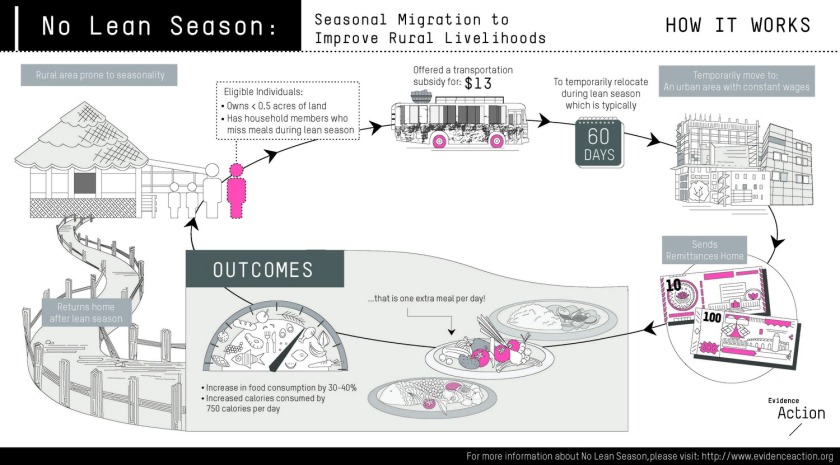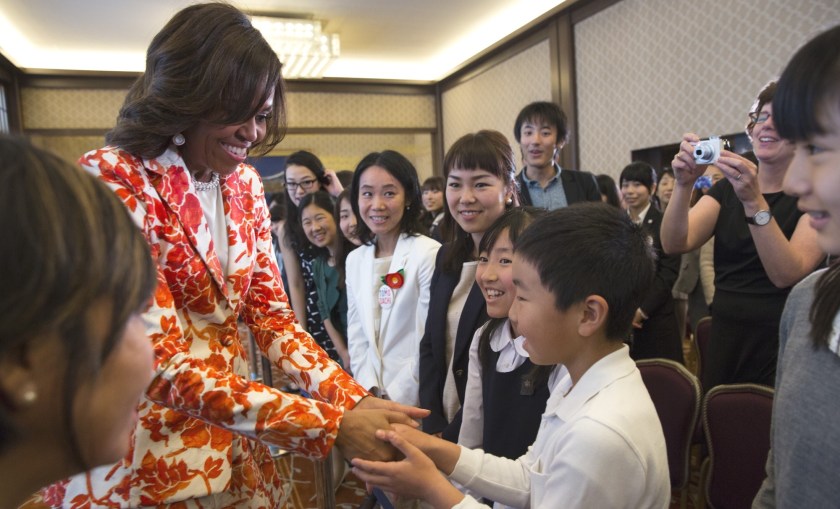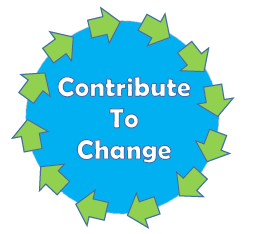Update 10/21/2019 – Author’s Note: Evidence Action, the nonprofit that runs No Lean Season has discontinued this program. However, Evidence Action is still doing a lot of good so I still support their other efforts. Learn more about why they stopped No Lean Season here: https://www.vox.com/future-perfect/2019/6/7/18654620/evidence-action-no-lean-season-givewell
It’s a cliché wish made by beauty queens everywhere: end world hunger. It may seem far-fetched with some 795 million food insecure people in the world, but what if something as simple as a bus pass could do the trick? Evidence Action’s ‘No Lean Season’ is a beta program that gives low-income agricultural workers the opportunity to migrate to urban areas so they can earn wages during their off-season.
When you think of the off-season in agriculture, you probably don’t picture farmers and ranchers struggling to put a meal on the table for their family. In the United States, ag producers benefit from the ability to store and market crops year-round. This enables them to make it through  the period between planting and harvest. Unfortunately, that’s not the case in many regions of the world. A 2016 Yale University study finds seasonal hunger affects 300 million of the world’s rural poor.
the period between planting and harvest. Unfortunately, that’s not the case in many regions of the world. A 2016 Yale University study finds seasonal hunger affects 300 million of the world’s rural poor.
‘No Lean Season’ has a solution to the problem: help low-income ag workers get another job during these months of sparse-income. Since many households are too vulnerable to risk migration, ‘No Lean Season’ alleviates this constraint by giving them a relatively small transfer covering the costs of transportation and a few days of food. This allows people looking for work to reach urban locations where jobs are available.
 Yale University says they’ve seen a 30-35% increase in food and non-food expenditures for households who accepted the incentive and sent a migrant to the city. In addition, 550-700 more calories are consumed per person per day under the program. This is the equivalent to an extra meal per person.
Yale University says they’ve seen a 30-35% increase in food and non-food expenditures for households who accepted the incentive and sent a migrant to the city. In addition, 550-700 more calories are consumed per person per day under the program. This is the equivalent to an extra meal per person.
Evidence Action is currently working with other organizations to bring No Lean Season to scale in Bangladesh between 2017-2021. It’s expected to directly benefit more than 310,000 households (with 1.4 million family members) over that period. Currently, they are researching other potential sites where they can test this solution and hopefully bring it to a global scale.
‘No Lean Season’ is still in early stages of development, but its innovative, yet simple approach to combatting hunger is something I thoroughly support. There will always be problems and there will always be solutions, but efficient solutions breed progress. That’s why I chose to donate to No Lean Season. You can follow this LINK and click on the ‘Give’ tab to donate as well.

Sources:
http://www.givewell.org/charities/evidence-action/march-2016-grant
http://www.wfp.org/hunger/stats
https://www.theigc.org/wp-content/uploads/2016/11/No-Lean-Season-1-pager-final-.pdf
http://faculty.som.yale.edu/MushfiqMobarak/featuredresearch/No%20Lean%20Season.pdf



 Let Girls Learn leverages public-private partnerships to provide safe access to schools, to help rebuild education systems, and to create alternative learning programs. The organization also trains thousands of volunteers and tens of thousands of community leaders to advance education and work with leaders on solutions to overcome these barriers.
Let Girls Learn leverages public-private partnerships to provide safe access to schools, to help rebuild education systems, and to create alternative learning programs. The organization also trains thousands of volunteers and tens of thousands of community leaders to advance education and work with leaders on solutions to overcome these barriers.
